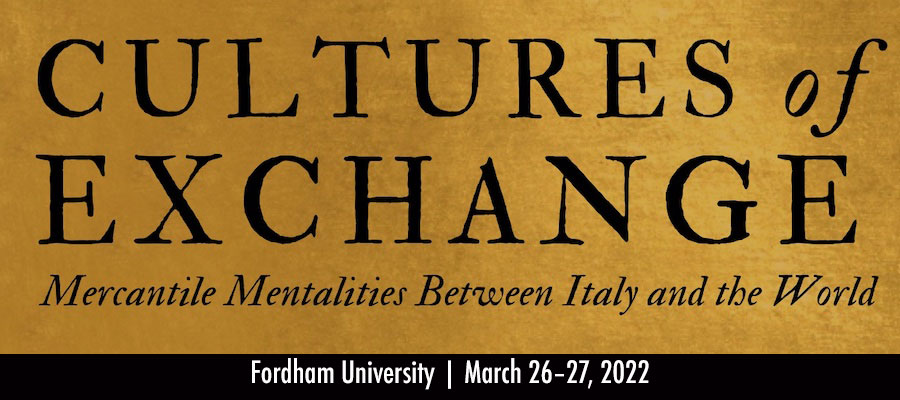Cultures of Exchange: Mercantile Mentalities Between Italy and the World, 41st Annual Conference of Fordham’s Center for Medieval Studies, Fordham University, Lincoln Center, March 26–27, 2022
Recent scholarship has shed light on the complexity of medieval Italy’s multifaceted political and intellectual landscape and attempted to place it within a Mediterranean and global context. At the heart of this landscape was an innovative, linguistically and culturally diverse mercantile culture, fundamentally urban and rooted in a culture of exchange, which integrated merchants and mercantile mentalities into the fabric of government, politics, and society. Positioned at the crossroads of many cultures of exchange, Italy’s mercantile culture was embedded within and contributed to broader, global networks. This conference aims to investigate the practices and values pioneered by merchants, both in Italy and beyond, their impact on political and economic life, as well as on the development of the arts and society’s response to catastrophic upheaval.
We welcome papers that consider the following or related questions:
- How should we define a medieval “Italian” mercantile culture, and what would it include? What were the continuities and changes that occurred in this culture between the Middle Ages and the modern world?
- How did mercantile culture influence structures of power in Italy, whether urban, royal, or ecclesiastical?
- How did mercantile patronage of the arts, architecture, and urban infrastructure influence the physical shape and appearance of the city?
- To what extent were innovative business practices and technologies instrumental to intercultural exchange, and how did practitioners adapt them in different religious or cultural contexts?
- What role did the agents of Italian mercantile culture play in African, Asian, and European networks of traders, travelers, and pilgrims, and what sorts of people, goods, and ideas moved within these networks?
- How do we write the medieval history of slavery and enslaved people, and what role did these people play in mercantile cultures?
- How was this mercantile culture expressed in the arts and literature in different Italian regions and elsewhere? How did Dante, Boccaccio, Petrarch engage critically with mercantile culture in their works?
- How did women and men depict themselves, their families, and urban life in the merchant world? What role did literature on travel and exploration, household management, business practice, accounting and mathematics, or works of history and cartography play in the formation of mercantile identity?
- What role did women play as economic actors (e.g. laborers, artisans, consumers, professionals, business owners, players or objects in the marriage market, and members of merchant households) in mercantile culture and society?
- How did mercantile culture relate to ideas about race, gender, and identity in Italy, Europe, and elsewhere?
- What were the ethical responses to mercantile society (theological, philosophical, and in humanist literature), including attempts to address poverty and charity, civic education, or the ethos of the marketplace?
- What was the impact of mercantile culture on the development of professions? How did professions (e.g. legal, medical, or diplomatic) contribute to public policy and regulation?
- How did mercantile society revive and restructure itself in response to challenges (plague, banking collapse, war, social unrest, etc.)? How did writers envision society emerging from crises and rebuilding in material, literary, political, moral, ethical terms?
- How have our own experiences of pandemic reshaped readings of Italian mercantile sources on plague, catastrophe, and recovery? How can medievalists who study these sources contribute to society’s recovery from its current crises?
